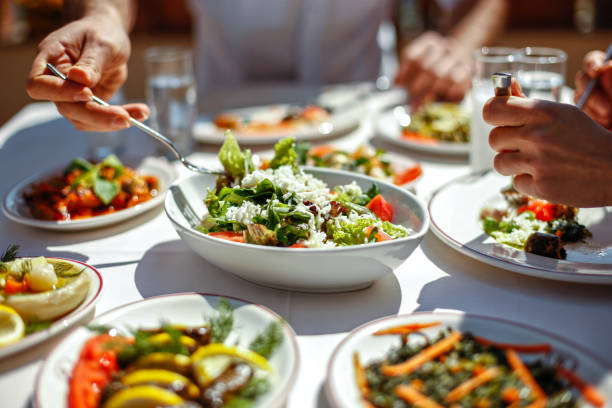If you’re in your mid-40s, you’ve likely been through many fad diets and nutritional holy grails in the last couple of years. As you’ve become more mature and knowledgeable, you’ve most likely found a way of eating that is good for you and leaves you feeling healthy and happy most of the time.
You may notice a few changes in your body during the last couple of years. “For most women, perimenopausal symptoms might have been happening since your mid-30s,” explained Dr. Stephanie Faubion, the medical director of the North American Menopause Society and the Mayo Clinic’s Center for Women’s Health. “The typical age to begin menopause is 45.”
There will be changes to come, but you can assist yourself in transitioning into the new phase of your life by making smart diet choices to help you age as gracefully as possible.
Faubion noted that you may already see weight gain or a change in the distribution of weight, with more of it settling in your belly. “We lose muscle mass by 1% a year after age 50, and most adults gain about a pound and a half each year progressively through middle age,” Faubion explained. But she also said that weight gain, although it can be a challenge, is sometimes inevitable.
“You can’t exercise it all off, so you need to pay attention to what you’re eating,” she stated. “You don’t have to deprive yourself, though, and you can have a beautiful, healthy diet that’s filled with fruits and vegetables.”
Here’s your ‘window to chance’ to eat more nitrate-rich vegetables.
Maryann Jacobsen is a registered dietitian and a midlife health specialist who pointed out that “many women over age 45 are at an increased risk for nutrient deficiencies, even when they eat the way they always have.”
She suggested that this could be the ideal time to change the priorities in your life. “Health experts call the time of life a ‘window of opportunity,'” she stated. “That’s because the decisions we make at midlife will affect our health in our older years.” It’s an ideal time to increase the amount of nitrate-rich foods like leafy greens, beets, and celery.
“These help women increase their nitric oxide levels that decline with both aging and hormonal changes,” Jacobsen stated. “In fact, one study showed that two salads a day helped increase nitric oxide-related blood flow in midlife women.”
Also, she suggested new attention to micronutrients, such as magnesium, zinc, choline, zinc omega-3s, iodine vitamins, and selenium. “Aging and lower estrogen levels affect how much of those micronutrients the body absorbs,” she explained.
Don’t be hungry, and take advantage of the protein.
“One of the biggest nutrition mistakes that I see is women going on extremely low-calorie diets,” explained Courtney Delpra, Dietitian at the Cleveland Clinic. “When your estrogen levels begin to fall, which they do in the mid-40s, it also reduces the size of your muscles. If you react by not eating, this could have a negative impact. Consider your metabolism as the equivalent of a bonfire. If you don’t have enough firewood on your “fire,” it will diminish. In the long run, eating less could affect the way you digest your food, which is why it’s important to consume enough calories from the right macronutrients.”
Delpra advised that you consume sufficient daily protein. “The biggest key is getting 20 to 30 grams of protein with each meal.” It is easy to take this amount and concentration on lean proteins, for example, 4 ounces of turkey or chicken, 3 ounces of fish or one cup of beans, or some seed or nuts.
“When it comes to higher-fat meats, such as red meat, the American Heart Association recommends just one to two servings per week,” she explained.
Consume more fiber to reduce cholesterol.
Although protein can be a great source of protein, as good as it may be, it’s only one element of the nutritional mix, and experts highlighted the importance of aiming for the right balance. “A common mistake women make is spending too much time focusing on one aspect of nutrition,” said Jennifer Salib Huber, a registered dietitian and licensed naturopathic doctor whose Instagram handle is @menopause.nutritionist.
“Some will overemphasize high-protein eating, and others will become overly focused on limiting carbohydrates to the point that they aren’t getting enough fiber.” It’s an error, as fiber is critical to keeping you healthy.
“Giving fiber intake a bump can help manage the 10% increase in cholesterol levels that most women often see in menopause, along with an increased risk of insulin resistance and diabetes,” she said.
There is a reason for this. American Academy of Family Physicians also recommends that women over 40 eat more fiber-rich foods like whole grains, berries, and nuts, aiming for a daily intake of around 25 grams. (Examples: Raspberries have 8 grams of fiber in a cup, nuts are 3 grams of fiber per ounce, while a cup cooked with oatmeal contains 4 grams of fiber.)
Ensure you eat a healthy enough food plan for your well-being.
“Women need to find a way to enjoy healthy eating that fits their life, without guilt,” Huber concluded. “It must be flexible and tolerant and not based on rules that dictate the foods you can and cannot consume. Therefore, allow yourself to lower the bar, and set your goal a lot of the time “good enough” instead of striving for perfection each time.”

